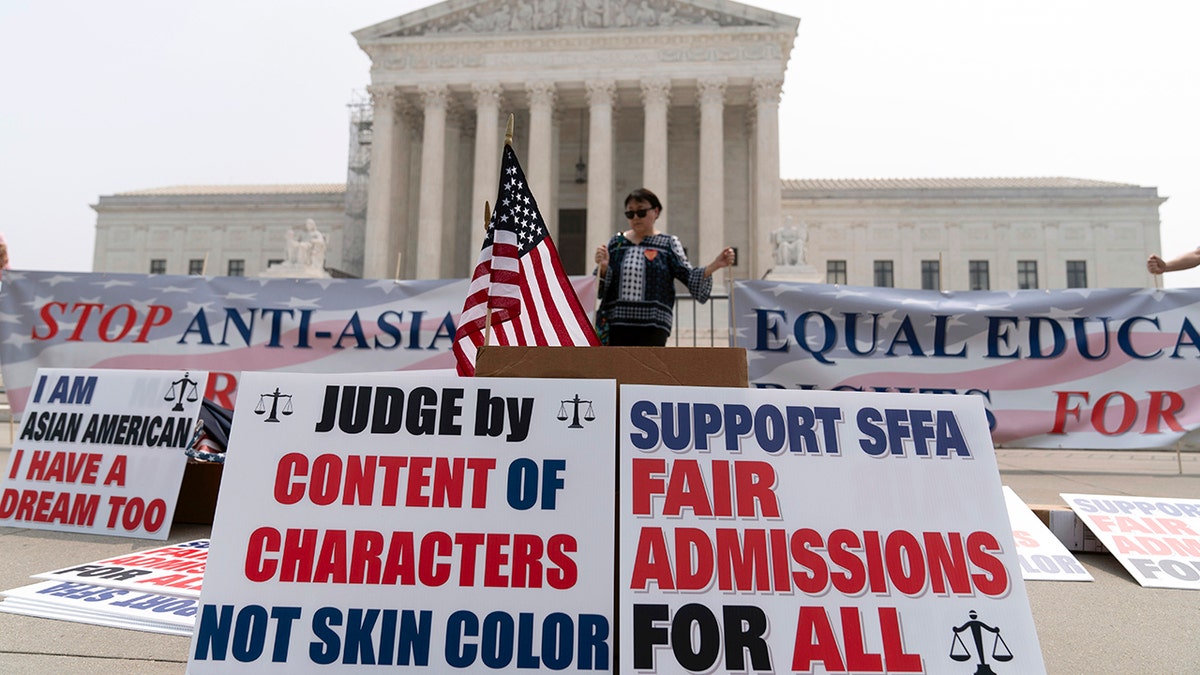Harvard student says DEI at school includes Jewish students in name only
Harvard University student Alex Bernat says the encampment on campus is disruptive to student life and blatantly antisemitic.
FIRST ON FOX: An association of medical professionals is sounding the alarm that medical schools across the country are "skirting" the Supreme Court’s ruling requiring admissions programs to abandon race as a factor.
Do No Harm, a group of physicians, nurses and other medical professionals "focused on keeping identity politics out of medical education," unveiled new research this week with findings that, despite the high court’s decision in the landmark affirmative action case last summer, "many in the healthcare establishment nevertheless remain ideologically committed to the principle of racial favoritism and reject the virtue of race blindness."
"Efforts to game admissions with an eye toward bolstering racial diversity commonly occur under the moniker of ‘holistic admissions,’" reads the study titled, "Skirting SCOTUS: How medical schools will continue to practice racially conscious admissions."
"In theory, holistic admissions should mean de-emphasizing the metrics that primarily determine admission to medical school (e.g., GPA and MCAT scores) and placing greater focus on other academic qualifications, personality traits, or professional accolades," it continues.

A person protests outside the Supreme Court in Washington, June 29, 2023. (AP Photo/Jose Luis Magana)
"In practice, ‘holistic’ admissions often represent a rebranding or workaround of affirmative action," it says.
The study says that though the case, Students for Fair Admissions v. Harvard, prohibits the use of race as a factor in college admissions, "many medical schools appear set to devise workarounds."
The study cites leading medical organizations that expressed dissatisfaction with the Supreme Court’s decision and their intent, in Do No Harm’s view, to "circumvent it."
The Association of American Medical Colleges (AAMC), for example, released a statement on the ruling saying, "The AAMC believes that a diverse and inclusive biomedical research workforce with individuals from historically excluded and underrepresented groups in biomedical research is critical to gathering the range of perspectives needed to identify and solve the complex scientific problems of today and tomorrow."
"We will work together to adapt following today’s court decision without compromising these goals," the group said.

In an interview with Fox News Digital, Dr. Stanley Goldfarb, board chair of Do No Harm, said schools appear intent on figuring out "ways around" the high court's decision. (iStock)
AAMC president David Skorton doubled down on racially conscious medical school admissions in a podcast, saying, "I’m feeling determined that we are going to continue to do the things we need to do to diversify the medical school classes and the health care workforce, not for any political or ideological reason, but because it’s good for the public health."
AAMC also updated its "about us" section on its website to say that while the Supreme Court’s decision and "anti-DEI legislation have restricted prior means of diversifying the health care workforce, many viable avenues remain to remove obstacles and increase opportunities for people historically underrepresented in medicine."
Similarly, Omar Atiq, president of the American College of Physicians, vowed to "continue to advocate for policies that can help to increase diversity and promote equity."

"Their responsibility is to the patients, to create the most qualified workforce that they can possibly create," Dr. Goldfarb said. (iStock )
"Medical schools and other institutions of higher education should consider a person’s race and ethnicity, alongside other factors that are often considered like socioeconomic status and geographic location, as part of evaluating applicants to counter both past and current discrimination," Atiq said.
In a statement to Fox News Digital, Skorton said, "Incorporating diversity, equity, and inclusion into medical education is about helping future doctors of all backgrounds better understand the specific issues that each patient is facing to provide better medical care. The AAMC and our member medical schools are committed to these objectives under the rule of law."
"The efforts of higher education institutions to pursue their missions by making adjustments to their processes should not be characterized as efforts meant to circumvent or evade but instead as examples of institutions working in compliance with specific state laws or court rulings," he said.
Skorton said that the Supreme Court's majority opinion "acknowledged that 'universities may define their missions as they see fit.' In other words, continued pursuit of these goals is permissible, but not through the means of considering an applicant’s race status."
"Achieving excellence in patient care requires a physician workforce capable of caring for all patients and their needs holistically. The most qualified applicants for medical school represent a combination of academic preparedness and core personal competencies. Holistic review considers both academic and nonacademic factors and helps to achieve their institutional missions of improving health outcomes for their patient populations," he said.
The roughly 15-page DNH study claims that when affirmative action was legal, universities could "engage in explicit racial preference without legal consequence," and that Asian applicants were negatively affected.
"Even though MCAT scores and GPA were integral to the admissions process, the penalties and bonuses assigned to members of racial groups became so extreme that Black applicants with average MCAT scores and GPAs were four times as likely to be admitted to medical school as academically equivalent Asian applicants," the study says, noting that Black students accepted to medical school have academic qualifications that mirror Asian applicants rejected from medical school.
CLICK HERE TO GET THE FOX NEWS APP
In an interview with Fox News Digital, Dr. Stanley Goldfarb, board chair of Do No Harm, said schools appear intent on finding "ways around" the decision. "They feel that diversity is such an important value in health care that they need to ignore the Supreme Court and go their own way."
"There’s really no justification of this," he said. "Their responsibility is to the patients, to create the most qualified workforce that they can possibly create."
Goldfarb said schools’ decisions could "come back to haunt them" and they could "end up getting sued."
The American College of Physicians did not immediately respond to Fox News Digtial's requests for comment.





